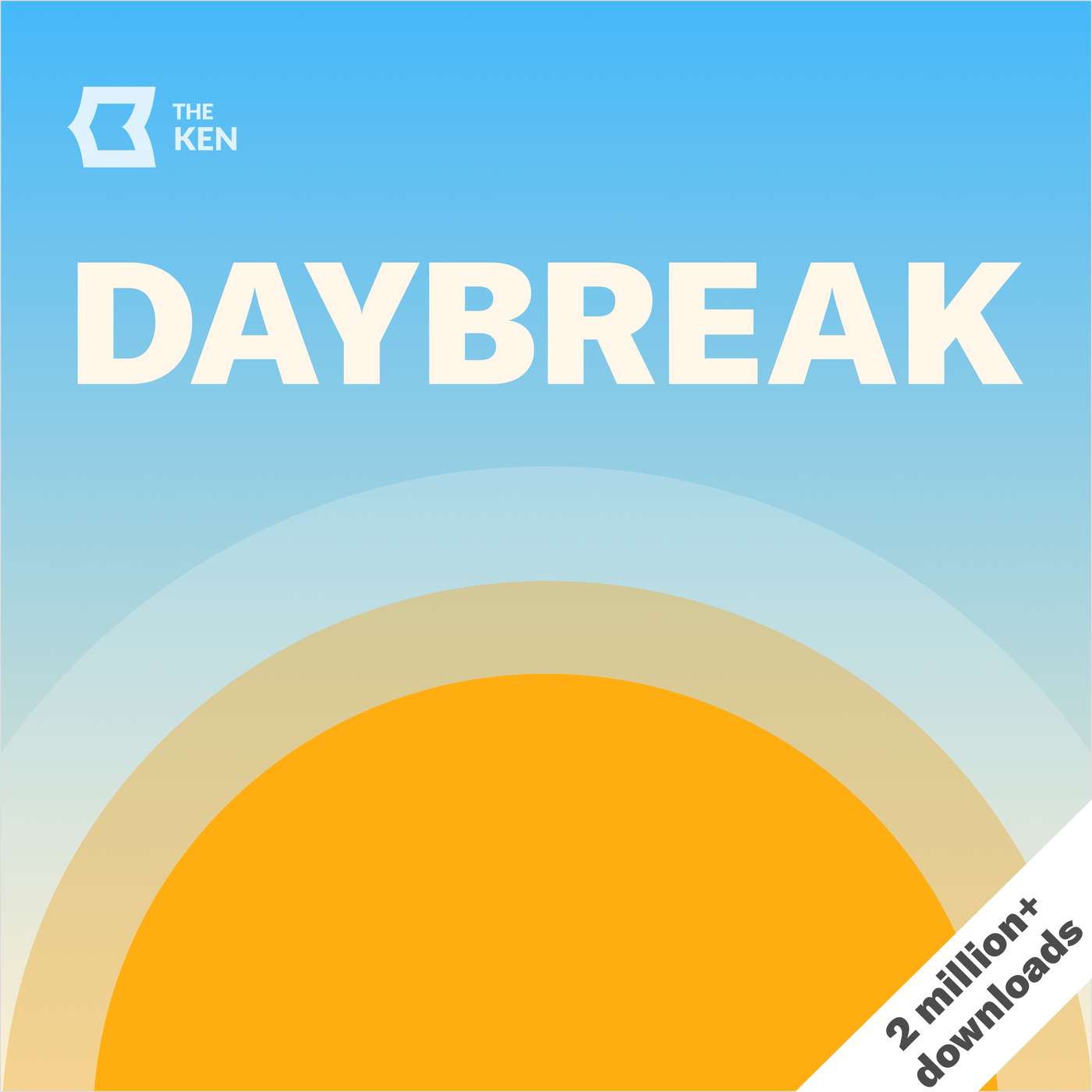Daybreak
Business news is complex and overwhelming. It doesn’t have to be. Every day of the week, from Monday to Friday, Daybreak tells one business story that’s significant, simple and powerful. Hosted from The Ken’s newsroom by Snigdha Sharma and Rachel Varghese, Daybreak relies on years of original reporting and analysis by some of India’s most experienced and talented business journalists.
The real reason why your fashion app knows you need something NOW

Instant fashion is everywhere now. Open Myntra or Ajio and you will see the option to get clothes delivered in minutes. But who is this really for?
Are shoppers truly demanding 30 minute outfits?
In this episode, we dive into what is driving the push for instant fashion, how it works behind the scenes, and why it has become such a high stakes bet for India’s biggest fashion apps.
Take this survey to share your best prompt.
Daybreak is produced from the newsroom of The Ken, India’s first subscriber-only business news...
India's farmers got faster loans. Then the prices crashed
Arya.ag helped India's farmers escape the grip of moneylenders.
They could now store their grain in proper warehouses, get loans in seven minutes, and wait for better prices instead of selling at harvest-time lows. But there's a problem: agricultural prices have crashed to five-year lows.
Wheat that sold for Rs 4,000 per quintal two years ago now fetches just Rs 2,600. For farmers like Himanshu and Neetu, the math is brutal—saving Rs 18,000 on interest means little when revenue has dropped by Rs 70,000. So, what's happening?
Tune in.
Take this survey to...
The AI running India isn't Indian. Can that still change?

India is using more AI than ever. But most of that intelligence is not Indian. OpenAI, Google and others are expanding in India fast. They already shape how millions work, learn, and search.
Meanwhile, India’s own sovereign AI model is only expected in 2026. Other countries like South Korea and China have already built and deployed theirs.
What does sovereign AI actually mean, why does it matter for everyday users and why is India is still struggling to build the full stack. And most importantly, who will build the AI that runs India’s future?
Why foreign stents still rule Indian hearts
A cardiologist in Nagpur performs two similar angioplasties. But the stents inside his patients tell two very different stories. One gets Indian-made devices under a government scheme. The other insists on an imported brand.
This contrast is now common across India. Price caps pushed foreign stent makers into a corner in 2017. But they never left.
And now, they’re back with new valves, pacemakers, and high-margin cardiac devices. Domestic players, meanwhile, grew fast but still struggle with data, technology, and trust.
Tune in.
Daybreak is produced from the newsroom of The Ke...
Why PVR Inox wants to run its cinemas like hotels
India’s largest cineplex chain, PVR INOX, has pulled off a major financial reversal, posting a ₹100 crore profit this quarter, a drastic recovery after bleeding nearly ₹12 crore last year. Over 40 million people showed up—but occupancy ratios are still struggling to cross 30%.
To fix this, PVR INOX is expanding into new, non-metro markets like Gangtok and Raipur. But there's a major twist: the company is no longer footing the bill for expansion.
Taking a page from hospitality giants like Marriott, PVR INOX is embracing an asset-light franchise model. Partners will now bankroll everything from projectors to seati...
How Trump became Indian apparel makers’ unlikely saviour
Tiruppur, Tamil Nadu, India’s knitwear capital, has long depended on massive U.S. orders that shaped its factories, products, and growth. But when the Trump administration imposed a 50% tariff on Indian garment imports, the town’s export engine received a long-pending shock.
Turns out, the crisis became a turning point. Manufacturers are now scrambling for discounts, shifting production to Sri Lanka and Kenya, reorienting toward Europe, and overhauling product lines from mass-market basics to intricate boutique styles.
Amid layoffs, automation, and global diversification, Tiruppur’s exporters are discovering something surprising.
This shock may be...
India wants third graders to learn AI. The teachers are not loving it
India's largest school board, CBSE, has announced that students as young as Class 3 will begin learning Artificial Intelligence.
This isn't the first time. The board rolled out an AI elective for Class 9 in 2019, long before generative AI was a household name. Now, the goal is to make "AI thinking" as fundamental as grammar.
We dive into this massive national experiment, exploring what "learning AI" means for a third grader—it’s less about building chatbots and more about "computational thinking." And the real test ahead isn’t the syllabus; it’s whether India can train millions...
Olympic swimmer Nisha Millet on why some goals should feel out of reach
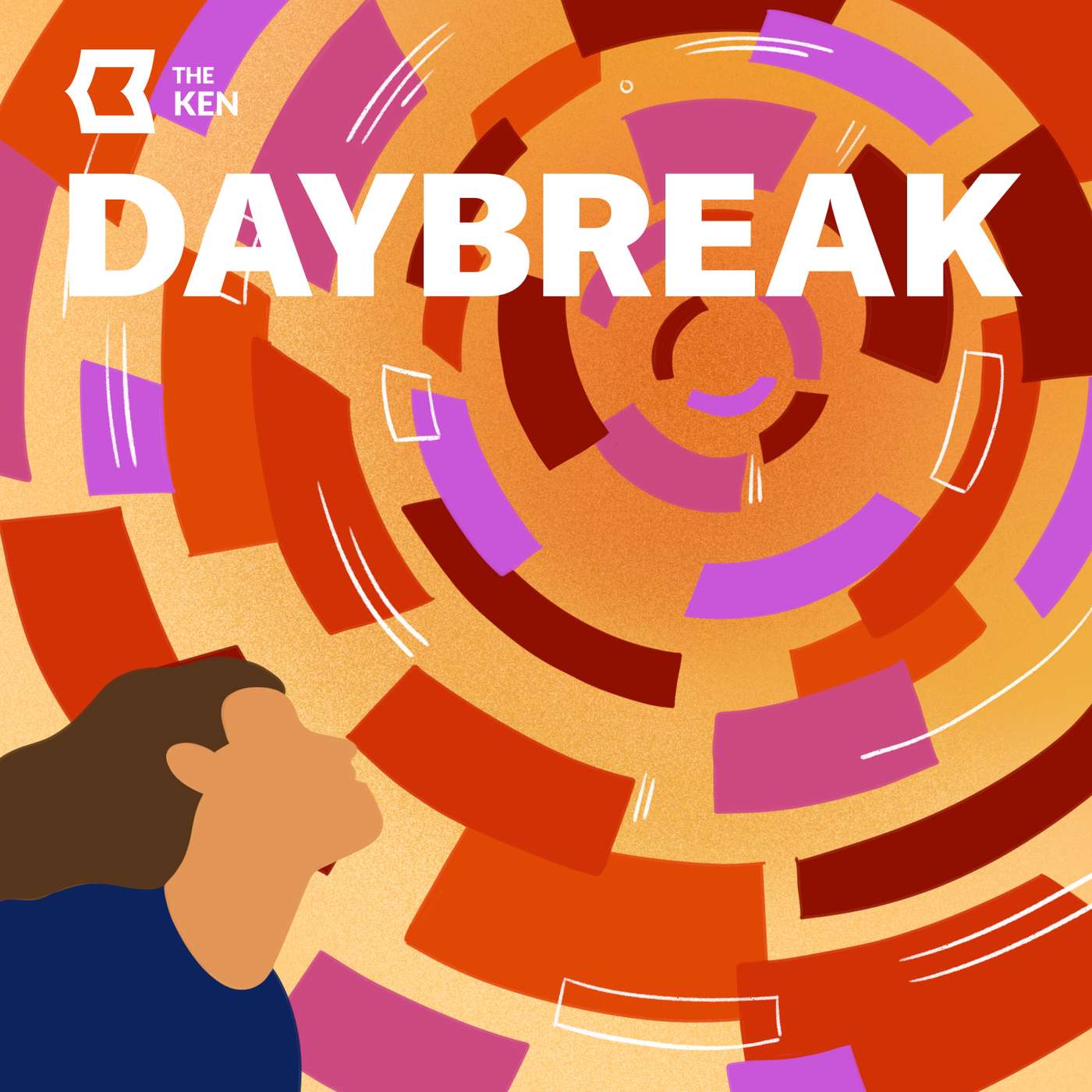
What does it take to perform at your best — not once, but over and over again? Olympian Nisha Millet has spent her life answering that question.
In sport, as in business, success isn’t about one big win — it’s about showing up, even when it’s hard. From the pressures of competing at the Olympics to building a career as a coach and entrepreneur, Nisha shares what the pool taught her about focus, resilience, and managing performance under pressure.
In this episode, we explore how elite athletes think about consistency, how they recover from failure, a...
SoftBank’s Nvidia move amid the AI frenzy is bringing India’s measured growth into view
SoftBank just sold about $5.8 billion worth of Nvidia shares earlier this week. The move frees up cash for new AI bets and comes as AI stocks power most of this year’s market rally. Nvidia’s rise has been spectacular but so have the warnings about overheating.
Some analysts see a rotation coming: money could move from pricey tech giants to steadier markets.
And that’s where India enters the picture. It’s grown slower, but on stronger fundamentals like broad demand, digital momentum, real earnings.
The question now is simple: when the AI fever co...
Why VLCC is still opening weight-loss clinics in the Ozempic era
When Ozempic began changing how the world lost weight, most slimming companies panicked. But VLCC didn’t. Backed by Carlyle, it’s opening more clinics than ever before.
Because to Carlyle, Ozempic isn’t a threat—it’s just another doorway into India’s beauty economy.
In this episode, we look at how VLCC’s new owners are turning an existential challenge into expansion, why its products are taking a back seat to real estate, and what the future of India’s weight-loss industry looks like in the age of GLP-1 drugs.
Tune in.
Joi...
Who benefits from the influx of foreign universities in India? Not students
In 2025, the University of Southampton became the first British university to open a campus in India. It was more than a milestone.
After a single policy change, foreign universities are rushing to claim their place in India’s higher-education market. States are competing to host them, and universities are chasing new revenue abroad. Everyone seems to be winning.
But beneath the glossy partnerships and big promises, what does this experiment really mean for students? And what happens when a “foreign degree” no longer means going abroad?
Tune in.
Daybreak is produced...
How AI turned banks’ risk data into advertising
Across India, lenders like HDFC and Kotak are repurposing the same algorithms that once judged credit risk to run hyper-personalised marketing campaigns.
These systems now predict who’s ready for a credit card, or insurance plan by studying every transaction, payment, and habit — turning customer data into personalised sales pitches.
The RBI has drawn clear lines for how AI can be used in lending. But when it comes to marketing, the rules are still fuzzy. That leaves space for India’s biggest banks to experiment—and for AI to quietly reshape how finance sells itself.
Tune...
After a year of contrasts, Zepto readies for the public markets

India’s quick-commerce poster child, Zepto, is racing to the public markets after a festive season high. The company clocked 20 lakh daily orders during Diwali — coming only second to Blinkit. But behind that surge lies a far more complicated story: leadership churn, regulatory heat, and a business model that’s still chasing profitability.
In this episode, we unpack Zepto’s dual reality — a startup celebrating record growth while quietly firefighting internal challenges. From FDA raids on dark stores and government warnings on “dark patterns,” to its clean-up act and pre-IPO tightening, we explore how Zepto is trying to look invest...
How BlackBerry’s revival story is running through India’s roads
Remember Blackberry? The phone that once ruled business meetings and earned the nickname “Crackberry”? It’s making a comeback—but this time, not in your pocket.
In this episode, we dive into Blackberry’s surprising pivot from smartphones to car software. Its QNX system now runs the brains of over 250 million vehicles worldwide, powering everything from navigation to safety. And the nerve centre of this quiet comeback? India.
With its Hyderabad hub, partnerships with Mahindra, Tata Motors, and Tata Elxsi, and a growing EV ecosystem, India is where Blackberry’s next growt...
What happens when hospitals and insurers stop talking
When your insurance card suddenly stops working, it is not just a glitch. It is the symptom of a deeper crisis in Indian healthcare.
Hospitals say insurers have failed to update reimbursement rates despite medical inflation. Insurers say hospitals are inflating bills and resisting standardization.
Millions of policyholders are caught between them, forced to pay out of pocket for care they thought was covered.
How did India’s healthcare system end up in this deadlock. And who really decides what your treatment is worth?
Tune in.
Daybreak is produ...
Did Groww's profits really triple before its IPO?
Groww, the platform that turned stock trading into an everyday habit, is gearing up for India’s biggest-ever broking IPO. On paper, it’s flying high — profits have tripled, revenues have surged past ₹4,000 crore, and competitors like Zerodha and Angel One are feeling the lagging behind.
But look closer, and the shine dulls a little. A big chunk of Groww’s recent gains comes from one-time accounting adjustments, while its active user base and broking income are already slowing. To keep the engine running, Groww is betting on a new frontier — lending — even as rivals crowd the same space.
Lenskart gave India affordable vision. Now the fine print’s finally coming into focus
Lenskart changed how India buys glasses. It made eyewear affordable, stylish, and available on every street corner. But behind that success is a story of shortcuts. Cheap acetate frames, thinner coatings, and rushed prescriptions have left many customers questioning the quality they once trusted.
As the company prepares to close a massive IPO, its promise of clarity is facing some uncomfortable scrutiny.
In this episode we look at how Lenskart built its empire on affordability and what that means for the people who actually wear its glasses.
Tune in.
Daybreak is...
ChatGPT is everywhere. Not everyone is impressed
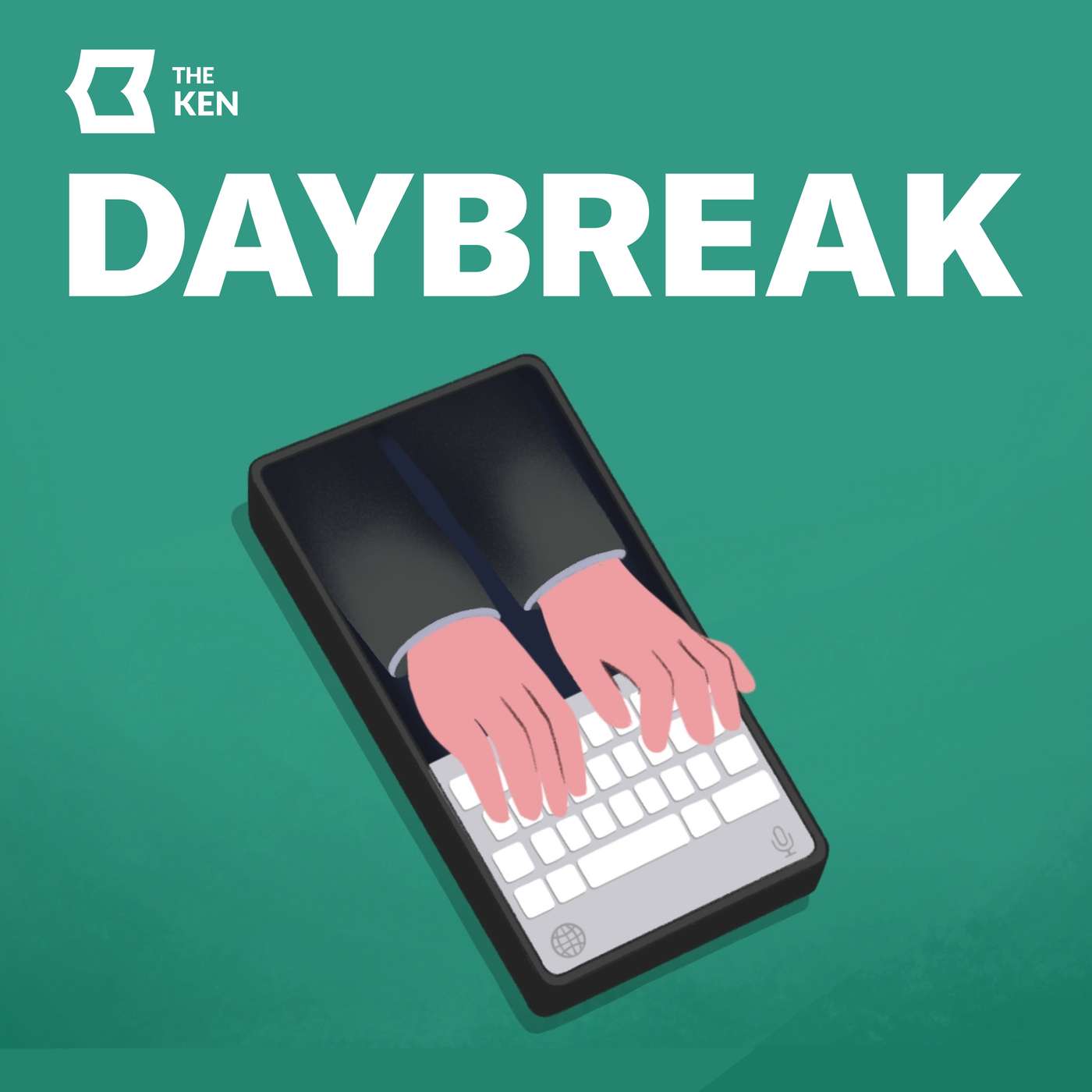
Last week, ChatGPT launched its own AI browser — a tool that promises to surf the web for you. It can summarise articles, add chocolates to your cart, or even tell you which email to reply to first (though… not always correctly).
OpenAI’s vision is clear: make ChatGPT the centre of your digital life. But are users buying in? From buggy app integrations with Canva and Spotify to real concerns around privacy and data access, this episode explores why AI-powered tools aren’t quite the game-changers they claim to be — yet. And why OpenAI keeps rolling them out anyway...
Ola’s investors want out. Bhavish Aggarwal won’t let go
Ola’s ride-hailing business is losing speed. Its market share has dropped from 45% in 2018 to around a quarter today and investors are running out of patience. Some even explored a merger with Rapido in late 2024 but the talks collapsed.
Bhavish Aggarwal’s focus on Ola Electric and his reluctance to sell have kept the cab business in limbo. Leadership churn, shrinking cash reserves, and a collapsing valuation have added to the strain.
So why can’t investors leave and why is Aggarwal refusing to let go?
Tune in.
Daybreak is produced from t...
How Doms is schooling ITC in India’s stationery business
If you’ve ever used a Classmate notebook or a Doms pencil, you’ve already been an unwitting part of one of India’s quietest rivalries in action.
For years, ITC ruled the stationery aisle — backed by its giant paper mills and powerful brands. But Gujarat-based Doms is catching up fast.
Since its 2023 IPO, Doms’ sales have surged, its stock has tripled, and it’s closing in on ITC’s notebook empire.
With everything made in-house and a perfectionist at the helm, Doms is turning pencils into profit, and giving one of India’s biggest conglo...
After a blockbuster IPO, LG faces a tougher test — selling luxury without losing loyalty
LG Electronics India just pulled off a record-breaking IPO, drawing bids worth over 4 lakh crore rupees. Investors love its dominance in consumer electronics and its unrivaled retail network. For decades, LG has built trust through deep relationships with local retailers, flexible margins, and a people-first culture.
But as the company shifts toward profit maximization and premium products, those same relationships could be tested.
Can a business built on generosity stay efficient enough to compete with rivals like Samsung and Whirlpool?
Tune in.
Daybreak is produced from the newsroom of The Ken...
The Big Four gain where Accenture and IBM feel the most pain
Accenture is reinventing itself. Literally. Its new “Reinvention Services” division, led by former Americas CEO Manish Sharma, is supposed to make Accenture the best version of itself for clients.
But inside the company? "Reinvention" signals a deep internal culling after nearly 11,000 job cuts. The layoffs, however are also fuelling a new kind of hiring boom elsewhere.
The Big Four—Deloitte, PwC, EY, and KPMG—are seizing the moment. As they race to turn themselves into AI and tech transformation powerhouses, corporate restructuring at tech-services giants like Accenture and IBM just made hiring tech talent a whole lot...
When Trump made H-1B visas costlier, these workers saw the silver lining
Trump hiked H-1B visa fees overnight. For Indian students and engineers, it was a shock. For GCC employees, it was a chance to step up.
While global capability centres handle tech, ops, and innovation, final decisions usually stay in the US. Senior employees started to wonder: could the visa disruption finally shift some power to India?
In this episode, we explore why GCCs’ leap from execution to strategy is still far from guaranteed.
Tune in.
⏳ How is AI changing your workday? Take our 5-minute survey: https://theken.typeform.com/to/yQTIG...
Meesho’s success story is written in cash but investors now see risk
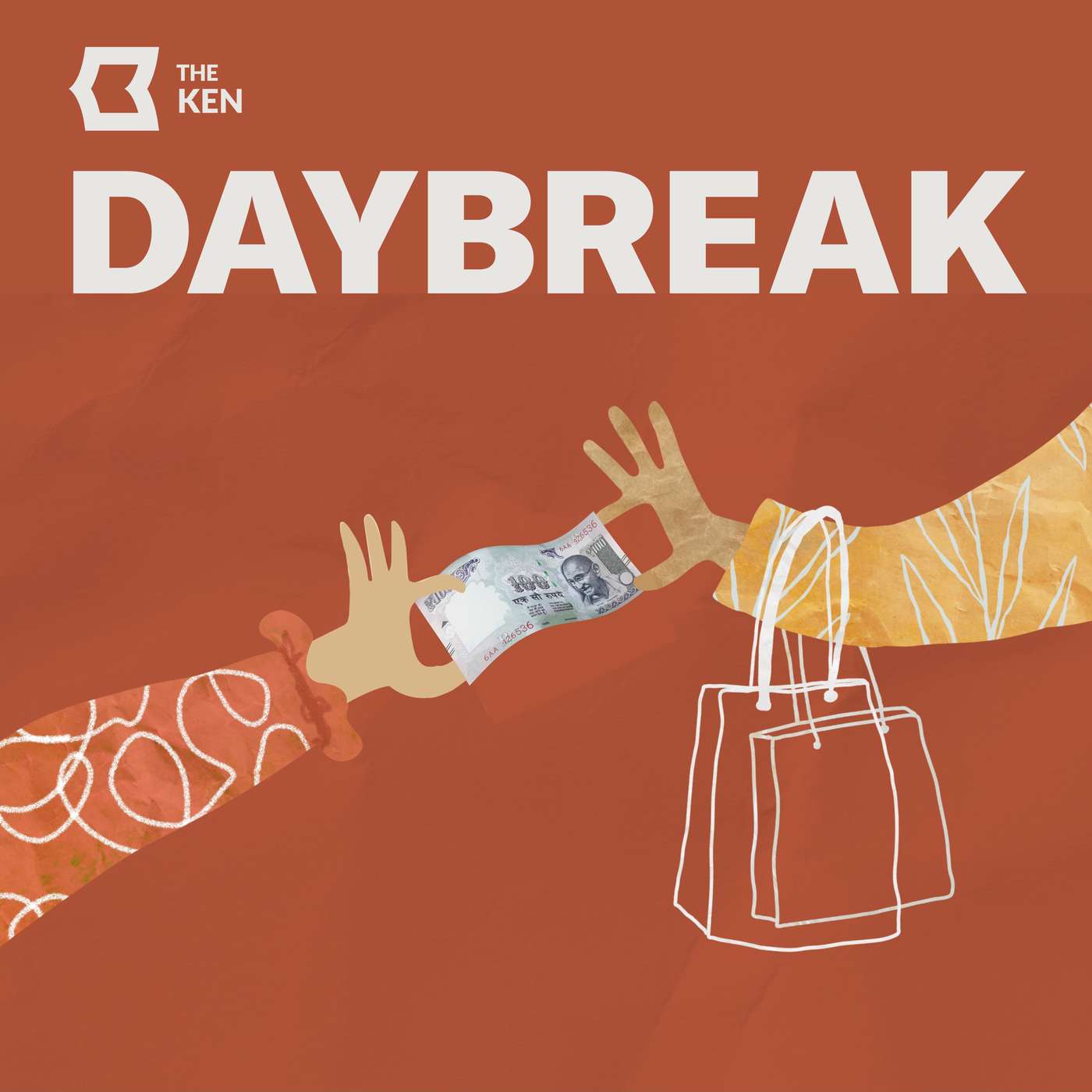
Meesho is preparing for one of India’s most watched IPOs. The company built its success in small-town India, where trust matters more than speed.
Over 75% of its orders are still paid in cash on delivery. That approach helped Meesho win millions of new shoppers and grow faster than bigger rivals. But it also ties up cash and squeezes margins, making investors uneasy.
Now Meesho is working with Razorpay to encourage more prepaid payments and faster settlements.
But can a company that grew by trusting cash-first customers convince them to go digital without lo...
How India’s call centre industry is being rewritten by AI
At 2 a.m. in Bangalore, a call-centre agent is resolving flight refunds with a new kind of colleague — one that never sleeps.
AI copilots are now embedded across India’s BPM sector, watching every click and keystroke to improve their own efficiency. For firms like Capgemini and Genpact, the real prize isn’t labour anymore — it’s workflow data.
Because in the race toward “agentic AI,” whoever owns the data, wins. And India, for all its scaled up manpower, might be training the machines that will one day replace it.
Tune in.
Daybreak is pr...
If AI is really changing everything… where’s the evidence?
Is the AI revolution already running out of steam?
Despite years of hype about a world transformed by smart tools and endless innovation, the data tells a quieter story. The growth is flat, the excitement is fading, and there have been fewer breakthroughs than expected. Has AI already peaked or are we just looking in the wrong places?
In today's episode, we dive into one of The Ken’s most thought-provoking essays by Praveen Gopala Krishnan, 'What does an AI bubble burst look like?'
Tune in.
Daybreak is produced from th...
Shopping at an Indian airport? Almost everything you touch could belong to Adani
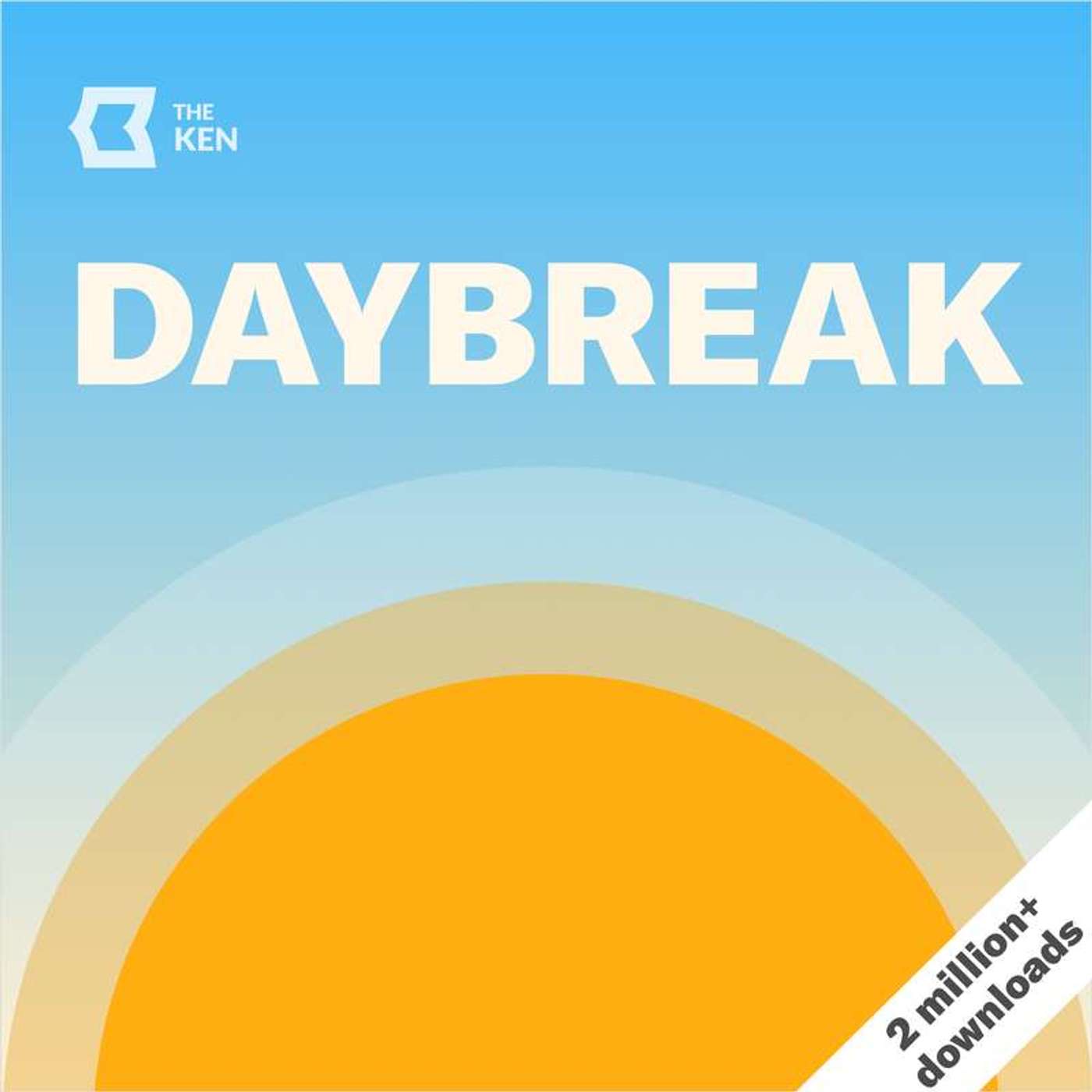
When Dreamfolks Services entered India’s aviation scene, it quietly built the plumbing that made airport lounge access possible. It linked banks, card networks, and travellers to hundreds of lounges nationwide. For years, it stayed out of sight, powering a privilege most flyers never thought twice about.
Now, it’s being shown the door.
Adani, India’s biggest airport operator, is moving fast to take full control — not just of the runways, but everything that happens beyond security. Lounges, food courts, duty-free zones, and retail stores are all coming under its fold. Some are being rebrande...
The lazy girl's guide to building quiet wealth
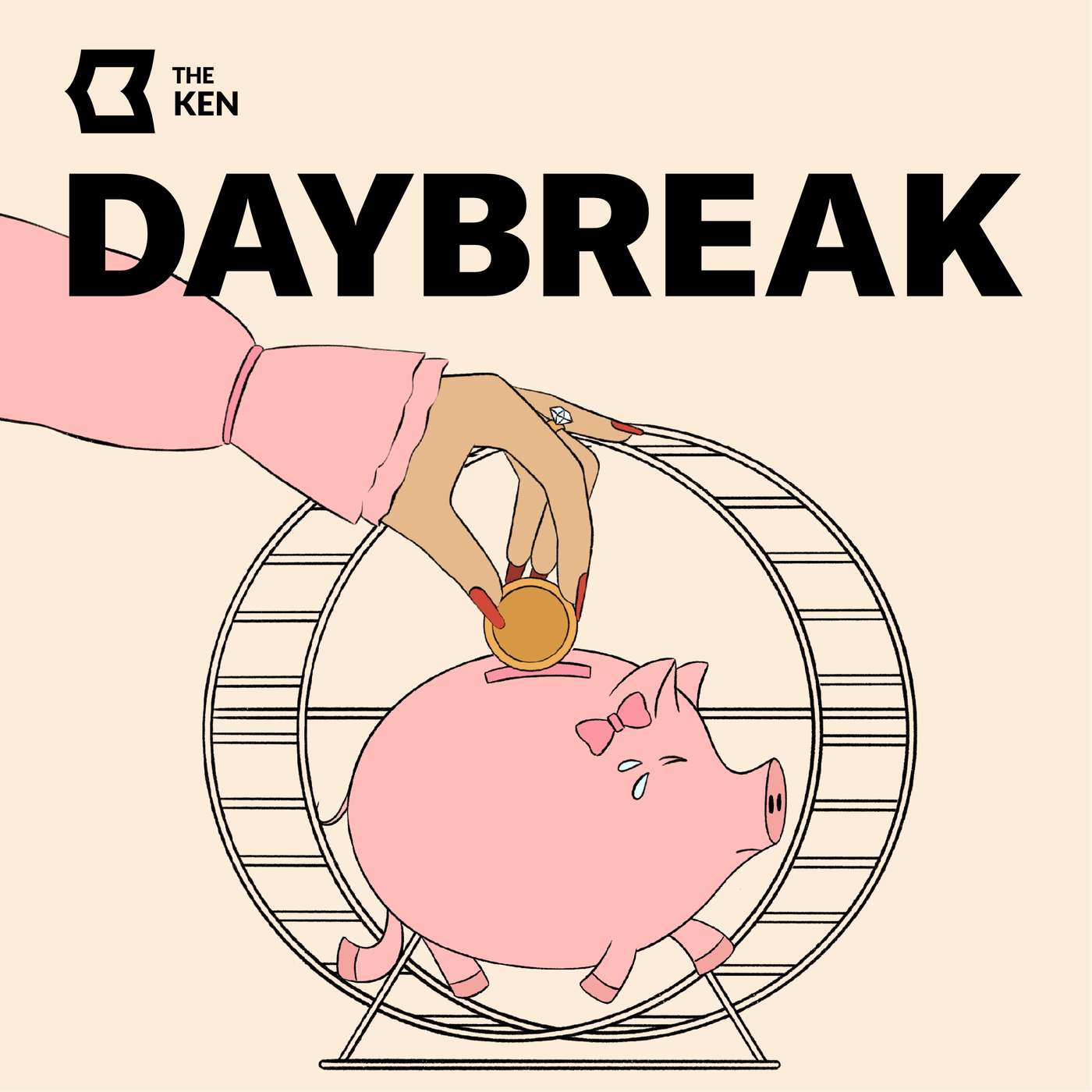
What if the smartest money move you ever make… is doing less?
In this episode of Daybreak, host Snigdha Sharma sits down with Megha Jose, CEO of Fortune Wealth Management and founder of Thryve, an investment advisory firm, to explore the idea of “Lazy Girl Investing.” Can women really build wealth without the burnout? And does the real rebellion lie beyond hustle culture?
From confronting financial shame to finding your “North Star” and rethinking how you see the stock market, Megha breaks down simple, low-effort systems that make your money work for you—quietly, confidently, and consiste...
Inside the metal market’s most surprising meltdown

Silver is having a moment, and not in the way you might think.
Once hoarded by billionaires, now sought after by AI and clean energy — the world is experiencing a historic silver crunch. Jewellers are refusing orders, mutual funds are freezing ETFs and Diwali shopping just got a lot more expensive.
The thing is, silver supply has been trailing demand for years now. And now, the gap is finally showing. What's behind this sudden shift?
Tune in.
Daybreak is produced from the newsroom of The Ken, India’s first subscriber-only business news...
The family office is the new family business for India's richest heirs
Across India, many heirs are stepping away from running their inherited businesses to run family offices instead. They see investing as more flexible, more global, and less tied to daily operations.Their parents built factories but they are more interested in managing portfolios.
It’s a practical shift but one that’s changing how old wealth works and what it values.
What’s driving this change and does India’s next generation of uber-rich business owners still want to build anything at all?
Tune in.
Daybreak is produced from the newsroom of The K...
Why only 1 in 10 interns join the PM Internship Scheme
Launched last year with the promise of 10 million internships, the Prime Minister’s Internship Scheme was meant to bridge the gap between young graduates and India’s job market.
A year on, the numbers tell a different story. Fewer than 9,000 interns have joined so far, even as top companies like TCS and Reliance came on board. Behind the slow start lie deeper problems — poor funding exacerbating a mismatch between corporate expectations and student realities.
Tune in.
Daybreak is produced from the newsroom of The Ken, India’s first subscriber-only business news platform. Subscribe for more...
OpenAI wants your kid's homework data
OpenAI’s latest classroom experiment is starting in India. A deal with the Arise school network gives 10,000 free ChatGPT licenses to teachers but the fine print has schools on edge.
But between NDAs, data collection, and new privacy laws, India’s educators are asking what OpenAI really wants from their classrooms.
Tune in.
Daybreak is produced from the newsroom of The Ken, India’s first subscriber-only business news platform. Subscribe for more exclusive, deeply-reported, and analytical business stories.
Join The Ken as a Podcast Producer and work with India's most ambiti...
Ozempic sparked the weight-loss drug trend. Mounjaro is leading it in India
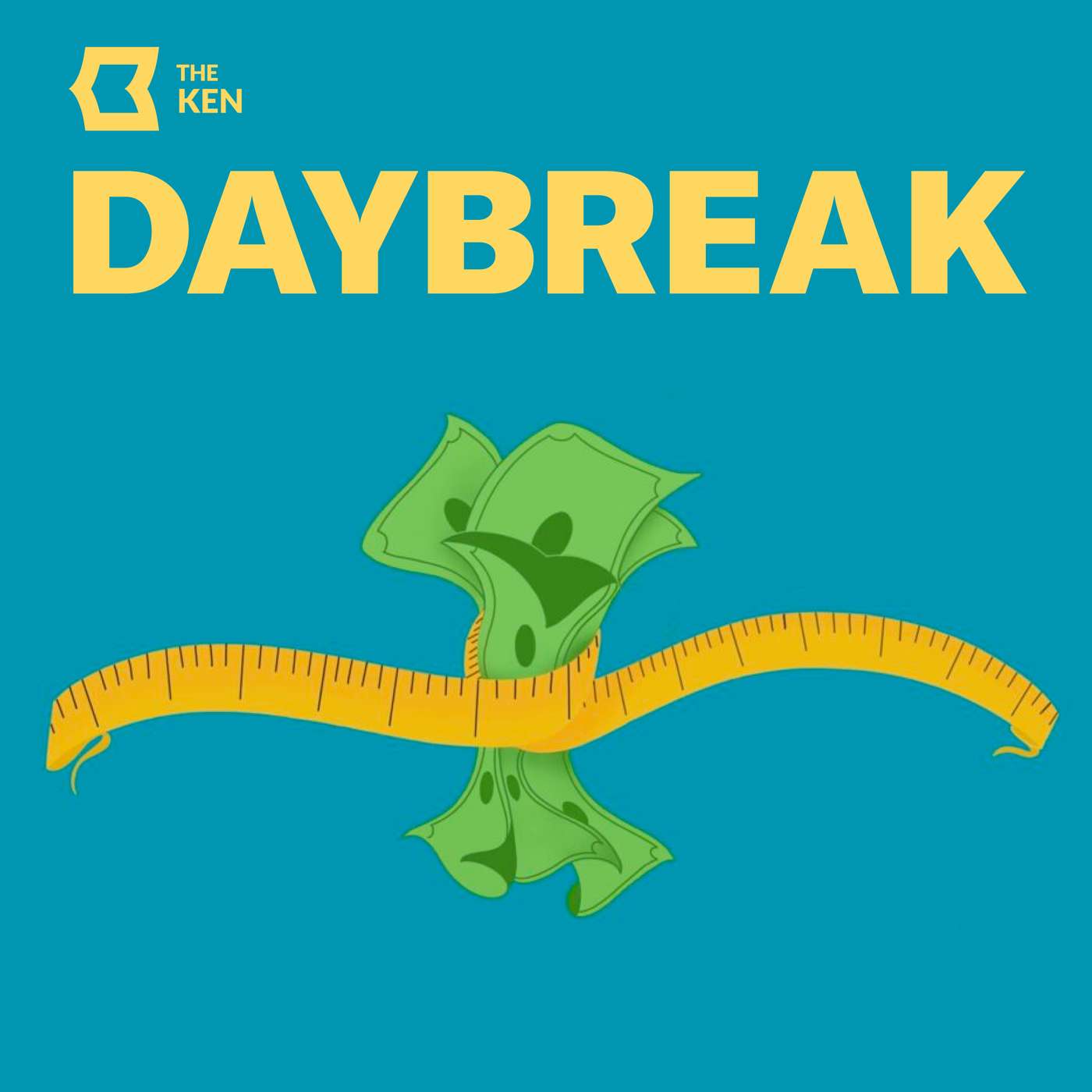
Six months after launch, Eli Lilly’s Mounjaro is already India’s second-biggest pharma brand, ahead of antacid Pan and just behind antibiotic Augmentin. Days later, Eli Lilly announced a $1 billion investment and a new Hyderabad hub.
The timing is no accident: India has one of the world’s largest obese and diabetic populations, Ozempic’s patent expires in 2026, and local pharma giants are gearing up with cheap GLP-1 generics.
In this episode of Daybreak, we unpack how this landscape presents both an opportunity and a challenge for Eli Lilly.<...
After Deloitte's blunder, the Big 4 may learn a new AI rule: being wrong first beats being right late

When Deloitte refunded part of the A$439,000 it was paid by the Australian government for a report riddled with AI-generated errors, it seemed like the perfect moment to slow down.
Instead, the firm doubled down and announced a global rollout of Anthropic’s Claude to nearly half a million employees. That decision captures the strange new logic shaping the Big 4 consulting companies. PwC, EY, KPMG, and Deloitte are no longer just using AI, they are performing it.
Audit and tax work has slowed, regulation is tightening, and growth now depends on signalling technological boldness. In thi...
At Fogg deodorant’s owner, KKR’s PE math clashes with family-business wisdom
Founded by the Patel brothers, Vini Cosmetics built Fogg into the country’s top deodorant brand with its no-gas formula, and high-margin pitch. In 2021, global giant KKR swooped in with a $600 million deal, valuing Vini at $1.2 billion—the biggest private equity play in Indian FMCG.
But the partnership never clicked. The founders refused to fully step back, while KKR struggled with the quirks of a brand-led business in a market it didn’t quite understand. Advertising budgets were slashed, rivals like Denver surged ahead, and new launches flopped.
Today, Vini is still profitable, but its margin...
How Dhan, a broking startup, defied a slowing market and turned from dark horse to unicorn

Even as markets wobble and trading volumes shrink, one online broker has raced ahead. Dhan, a four-year-old broking startup, managed to grow rapidly, post profits, and raise $120 million at a $1.2 billion valuation—all in the middle of a market correction.
In this episode, we look at Dhan’s journey from a niche platform for power traders to one of India’s newest unicorns.
What's making investors so bullish on Dhan when the rest of the industry is slowing down?
Tune in.
Correction note: In this episode, the host mistakenly referred to Dhan’s...
How a tiny AI startup is giving IT sales a human touch
Humantic AI is changing up IT services sales. Founded by serial AI entrepreneur Amarpreet Kalkat, the 24-person startup has built what it calls “buyer-first intelligence”—using AI to decode a client’s personality, communication style, and preferences from public data.
Humantic wants to give sellers an instant human edge in billion-dollar deals. But challenges loom. Enterprise buyers are wary of bloated sales stacks, and Humantic will have to prove it’s more than just another disposable add-on in a sector already crowded with AI promises.
Tune in.
Daybreak...
Phonepe is taking the IPO leap. But can it avoid Paytm’s fate?

Phonepe is stepping into the public markets with a $15 billion IPO. For Walmart, which has pumped billions into the payments firm, this is both a chance to cash in and a test of its India strategy.
Unlike Paytm’s disastrous, hype-heavy listing in 2021, Phonepe is going in with steadier financials, fewer regulatory scrapes, and the scale to back its story. Yet, the timing isn’t without risk: subsidies are shrinking, UPI share caps are on the horizon, and investor appetite has cooled since 2021.
Tune in.
Daybreak is produced from the newsroom of The Ken...
India’s FMCG leaders are in a heated race for your spice cabinet
India’s packaged-food bigwigs ignored spices for a long time. Not anymore.
Since 2020, everyone from ITC to Tata Consumer Products, from Dabur to Wipro, has been scrambling to cement their place in this essential corner of the Indian kitchen. They’ve pounced on spice brands, sometimes paying top dollar for them, all while their investors cheered them on. In fact, the stocks of Tata Consumer and ITC have both outperformed the S&P BSE FMCG index over the last five years.
Turns out, this was all the vindication that Norwegian conglomerate Orkla needed to go publ...
The billion dollar market Kashmir can't claim
It takes 150 crocus flowers to make just one gram of saffron. For comparison, a spice like cumin, gets you hundreds of kilos per acre whereas saffron yields barely two.
Despite getting a prestigious GI tag from the Indian government and even a National Mission dedicated to its revival, Kashmir’s saffron production has plummeted:from 8 tonnes in 2011 to just 2.7 tonnes in 2024.
So what’s going wrong? And can India learn something from Iran, which currently dominates 90% of the global saffron market?
Reporters Mehroob Mushtaq and Numan Bhat, traveled deep into saffron country, met the...
